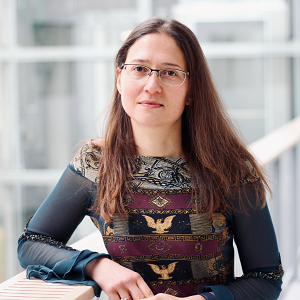
María Jesús Rodríguez Triana
| AREA | RESEARCH GROUP | INSTITUTE |
|---|---|---|
| Major: Information and Communications Technology Secondary: Educational Sciences |
Group on Intelligent and Cooperative Systems / Education, Media, Informatics and Culture (GSIC/EMIC) |
I completed my doctoral studies at the GSIC-EMIC group, receiving my PhD in Information and Communication Technologies from University of Valladolid (UVa) in 2014. That same year, I joined the REACT group at the École Polytechnique Fédérale de Lausanne in Switzerland, as a Postdoctoral Fellow. In 2016, I joined Tallinn University as a Senior Research Fellow, becoming Associate in 2021. Since April 2024, I am a Ramón y Cajal research fellow at Uva. Aside from my long-term appointments at EPFL and Tallinn University, I have performed research stays at the Université Joseph Fourier (France, 2013), the University of Twente (The Netherlands, 2019) and the University of Valladolid (Spain, 2021).
Along these years, I have co-supervised successfully six PhD theses and I have been involved in the writing and execution of 22 educational technology research projects at the national and international levels, with a combined worth exceeding 25 million euros. As a result, I have coauthored more than 100 peer-reviewed publications. Also, I have been chair of 3 international conferences, have been invited as keynote, and organized several workshops and special issues, and acted as research project evaluator for the Riksbankens Jubileumsfond foundation (Sweden).
The interest of the scientific community in my contributions is also reflected in multiple awards, such as the Estonian National Research Award (2020), the Best Research Paper (2016) and Best Student Paper (2011) at the EC-TEL conference, or the Special Mention to the best doctoral thesis in technology-enhanced learning by the eMadrid network (2015).
My multi-disciplinary research work applies computer science and digital technologies to education. My contributions to the area of Learning Analytics (LA) have been of specially oriented to support pedagogical approaches such as collaborative and inquiry-based learning. The contributions range from technological system architectures and data models to conceptual frameworks and novel analysis methods. To develop these contributions, I have applied methods and techniques from both computer science (e.g., machine learning and human-centred design) and social sciences (qualitative data analysis, statistical methods, etc.).
While Learning Analytics (LA) has been heralded as a scalable solution to personalization and learner variability, in my previous research, I have noticed that its advances encountered low classroom adoption, in part due to a lack of trust by teachers. Further, widely implemented LA solutions still rely on traditional data sources (e.g., logs) and basic data analysis techniques (e.g., descriptive statistics), and have not leveraged the full potential of LA (and artificial intelligence more generally). My trajectory and contributions to pedagogically-grounded and multimodal LA lead me to believe that putting stakeholder values and interests at the centre of educational/LA technology design is critical. However, for this LA/AI support to permeate educational stakeholders' daily practices, multiple research questions and contributions are still pending (e.g., proposing AI models connected to different pedagogical theories, assessing the models’ generalizability, proposing processes to build trustworthy solutions for human-AI teams; designing AI tools to support teachers and students and inline with their values). With these advances, teachers will be able to better direct their efforts in complex learning settings (e.g., involving active learning and digital technologies), students will develop self-regulated learning skills. Moreover, teacher trainers and tool providers will be able to better identify and support the teaching and learning needs. These research lines make up my research agenda for the following years.

